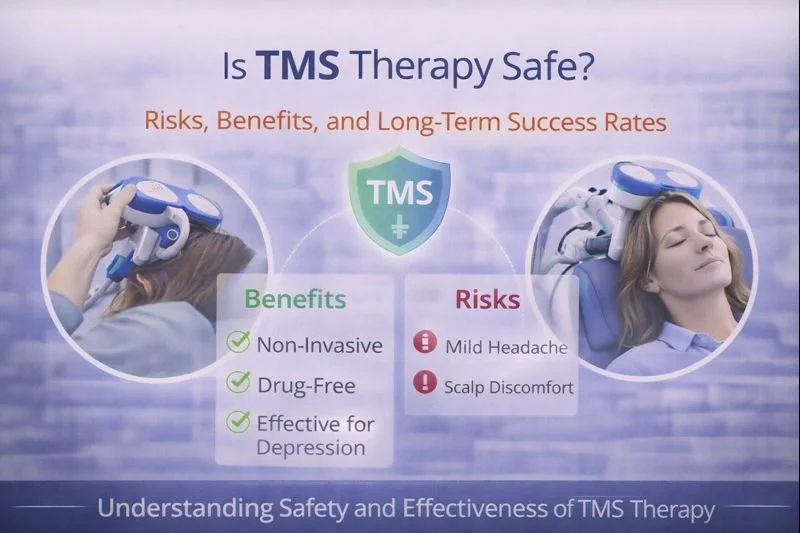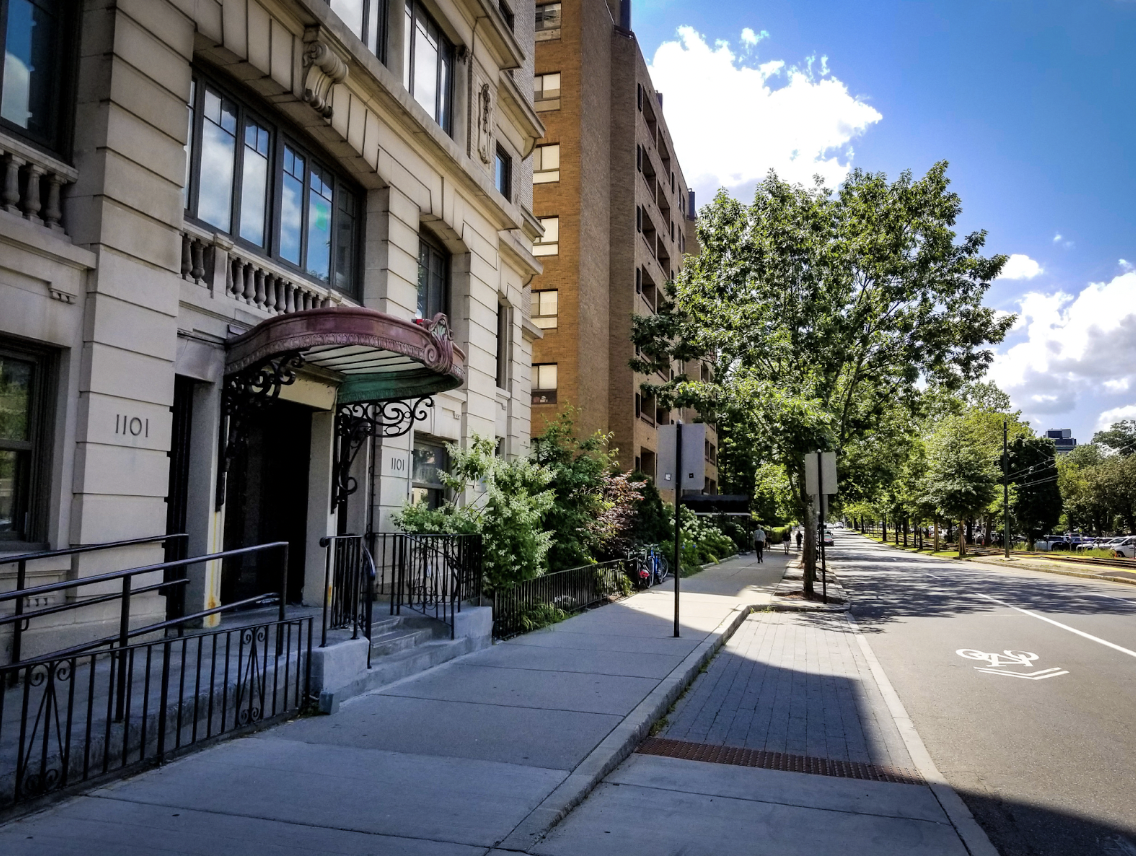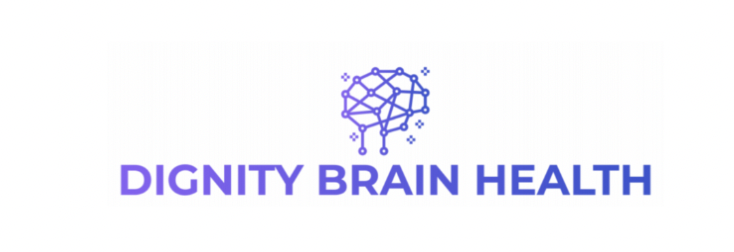Is TMS Therapy Safe? Risks, Benefits, and Long-Term Success Rate
What is TMS Therapy?
Transcranial Magnetic Stimulation (TMS) is an FDA-approved, non-invasive treatment for depression that uses magnetic pulses to stimulate specific areas of the brain responsible for mood regulation. Unlike traditional treatments like medication, TMS therapy offers a drug-free alternative with minimal side effects. It has been particularly effective for individuals who have not responded well to antidepressant medications.
TMS therapy is conducted in a clinical setting under the supervision of trained specialists. The treatment does not require anesthesia, and patients can drive themselves home immediately after their session. With an increasing number of people seeking alternatives to medication, TMS has emerged as a promising solution for individuals struggling with treatment-resistant depression.
Is TMS Therapy Safe?
TMS therapy is considered very safe when administered by trained professionals. Since its FDA approval in 2008, thousands of patients have undergone TMS therapy with minimal side effects and high success rates.
A comprehensive study published in Brain Stimulation (2017) analyzed over 10,000 TMS treatment sessions and found that serious adverse effects were extremely rare. The study concluded that TMS therapy has an excellent safety profile, making it a viable option for individuals with treatment-resistant depression (Lefaucheur et al., 2017).
How Does TMS Therapy Ensure Safety?
TMS therapy operates using precisely controlled magnetic pulses that target specific brain regions. The technology has built-in safety measures to ensure the magnetic field remains at a safe intensity, preventing any potential harm. Additionally, treatments are administered by licensed professionals who continuously monitor the patient’s response, making adjustments as needed to enhance comfort and effectiveness.
Common Side Effects
Mild scalp discomfort or headache during or after treatment
Tingling or tapping sensation on the scalp
Temporary lightheadedness
These side effects usually subside after a few sessions as the body adjusts to the treatment. Many patients find the sensation to be manageable and compare it to a mild tapping feeling on the head.
Rare Side Effects
Seizures (less than 0.1% risk, making it extremely rare)
Hearing sensitivity (prevented by wearing earplugs during treatment)
Manic episodes (only in individuals with underlying bipolar disorder)
TMS Therapy vs. Other Depression Treatments
Compared to antidepressant medications, which can cause severe side effects such as weight gain, sexual dysfunction, and emotional blunting, TMS therapy is much safer. Unlike electroconvulsive therapy (ECT), which requires anesthesia and can lead to memory loss, TMS therapy is non-invasive and does not impair cognitive function.
Clinical Evidence Supporting TMS Safety
In addition to the Brain Stimulation study, a 2018 meta-analysis published in JAMA Psychiatry reviewed multiple clinical trials and found that TMS therapy has a lower risk of adverse effects than pharmacological treatments. The study reaffirmed that TMS therapy does not lead to long-term neurological issues and is well tolerated by most patients.
Further supporting the safety of TMS therapy, Lefaucheur et al. (2017) published Evidence-based guidelines on the therapeutic use of repetitive transcranial magnetic stimulation (rTMS) in Brain Stimulation, analyzing clinical trials and concluding that TMS is a safe and effective treatment for depression. Their review of thousands of treatment sessions confirmed that the risks associated with TMS are minimal, particularly when compared to other depression treatments.
When performed by trained specialists, the risks associated with TMS therapy are minimal. The safety profile of TMS is significantly better than many traditional depression treatments, especially for those who experience severe medication side effects.
Benefits of TMS Therapy in Boston
Boston is home to some of the best mental health specialists in the country, making it an ideal location for those seeking TMS therapy. If you're struggling with depression and haven't found relief through medication, TMS therapy could be the breakthrough you've been searching for.
Key Benefits:
Non-invasive and drug-free
Minimal side effects
Effective for treatment-resistant depression
No anesthesia or sedation required
Convenient in-office sessions with no downtime
Long-lasting results
Patients often report feeling more energized, focused, and emotionally balanced after completing a full course of TMS therapy. Unlike medications, which may take weeks to work and often cause unwanted side effects, TMS offers a more targeted approach to improving brain function.
***
🌟 Looking for TMS Therapy Near You? Where to Get TMS Therapy for Depression in Boston
📍 Conveniently located near:
✅ Boston, Cambridge, Newton, Alston, Somerville, & Back Bay
Dignity Brain Health - TMS Therapy Clinic
💡 Why Choose Dignity Brain Health for TMS?
✔️ Expert Boston TMS Specialists – Harvard Medical School-trained; Treating depression with TMS since 2017.
✔️ Personalized Treatment Plans – Tailored to your unique mental health needs.
✔️ Insurance-Friendly Process – We handle the paperwork for you.
✔️ Proven Results – TMS can improve symptoms for patients who haven’t responded to medication.
📅 Take the First Step Toward Relief
👉 📆 Find Out If TMS Is Right for You; Book Your TMS Consultation Now (Insurance-Covered)
💬 Still have questions? Contact us today and speak with a specialist about whether TMS therapy is right for you!
***
🌍 Mental Health Resources in Boston for Depression & TMS Therapy
If you or a loved one are struggling with depression, these trusted resources in Boston offer professional support:
🔹 Massachusetts General Hospital Psychiatry Department – Offers psychiatric evaluations, therapy, and medication management for depression and anxiety.
🔹 Boston University Center for Psychiatric Rehabilitation – Specializes in mental health recovery programs, vocational rehabilitation, and outpatient services.
🔹 Samaritans Boston (Suicide Prevention) – A free 24/7 crisis helpline offering confidential emotional support.
Dignity Brain Health is committed to helping patients find the best mental health care in the greater Boston area.
References
Lefaucheur, J. P., Aleman, A., Baeken, C., Benninger, D. H., Brunelin, J., Di Lazzaro, V., Filipović, S. R., Grefkes, C., Hasan, A., Hummel, F. C., Jääskeläinen, S. K., Langguth, B., Leocani, L., Londero, A., Nardone, R., Nguyen, J. P., Nyffeler, T., Oliveira-Maia, A. J., Oliviero, A., Padberg, F., … Ziemann, U. (2020). Evidence-based guidelines on the therapeutic use of repetitive transcranial magnetic stimulation (rTMS): An update (2014-2018). Clinical neurophysiology : official journal of the International Federation of Clinical Neurophysiology, 131(2), 474–528. https://doi.org/10.1016/j.clinph.2019.11.002
Martin, J. L., Barbanoj, M. J., Schlaepfer, T. E., Thompson, E., Pérez, V., & Kulisevsky, J. (2003). Repetitive transcranial magnetic stimulation for the treatment of depression. Systematic review and meta-analysis. The British journal of psychiatry: the journal of mental science, 182, 480–491. https://doi.org/10.1192/bjp.182.6.480
—
CONTACT INFO:
DIGNITY BRAIN HEALTH
1101 BEACON STREET, SUITE 8W
BROOKLINE, MA, 02446
UNITED STATES
Phone: (617) 855-7288



